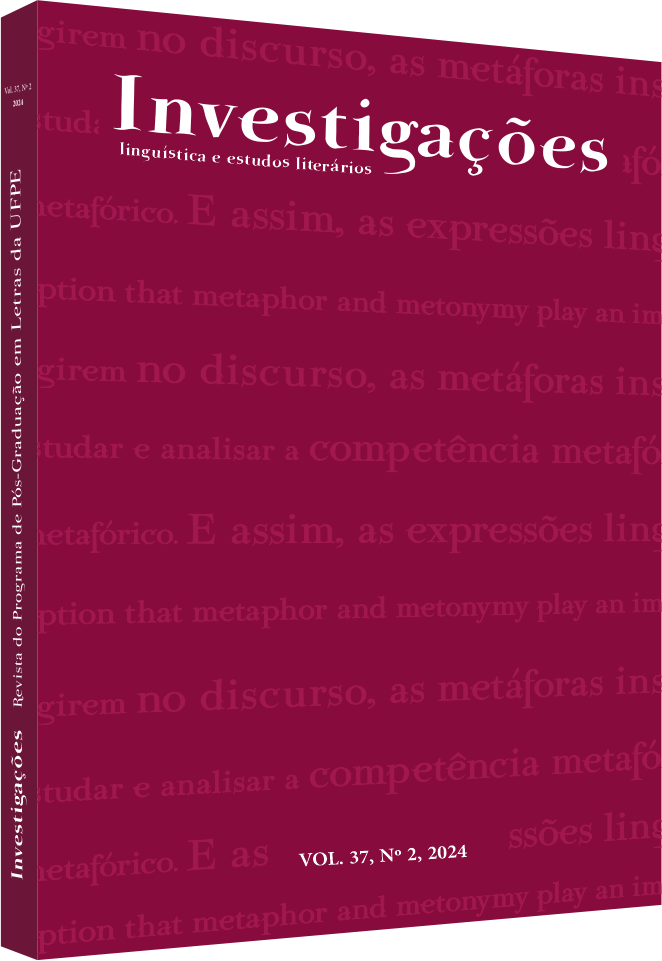The construction of humor in memes about Edgar Allan Poe
DOI:
https://doi.org/10.51359/2175-294x.2024.263427Keywords:
humor, cognitive linguistic, Edgar Allan Poe, memesAbstract
This work aims to identify the construction of humor in two memes focused on the North American writer Edgar Allan Poe. Based on the structuring and multimodal characteristics of memes, the methodology is guided by a qualitative interpretive approach as well as by basic and descriptive nature. It articulates the incongruity theory of humor with linguistic cognitive theories. Thus, we can see that humor, in the selected memes, emerges from inconsistencies that are motivated, mainly, by conceptual metaphors (ontological, monomodal and multimodal) and metonymies.
References
CAVALCANTE, M. M.; OLIVEIRA, R. L. de. O recurso aos memes em diferentes padrões de gêneros à luz da Linguística Textual. Revista Desenredo, Passo Fundo, v. 15, n. 1, p. 8-23, 2019. Disponível em: https://seer.upf.br/index.php/rd/article/view/8931. Acesso em: 25 nov. 2024.
CIENKI, A.; STANOPOULOU, A. V. “Do início ao fim”: Multimodalidade variável em construções como categorias de protótipos. In: CAVALCANTE, S.; GABRIEL, R.; MOURA, H. (org.). Linguagem, cognição e cultura: Estudos em interface. Campinas: Mercado de Letras, 2021. p. 97-125.
DALMOLIN, A. R. et al. O Riso como Resistência: Memes contra Bolsonaro no Contexto da Pandemia. DeSignis, Rosário, n. 41, p. 179-191, 2024. Disponível em: https://www.designisfels.net/capitulo/i41-14-o-riso-como-resistencia-memes-contra-bolsonaro-no-contexto-da-pandemia/. Acesso em: 25 nov. 2024.
FAUCONNIER, G.; TURNER, M. The way we think. New Yorker: Basic Books, 2002.
FERRARI, L. Introdução à Linguística Cognitiva. São Paulo: Contexto, 2020.
FILLMORE, C. J. Scenes-and-frames semantics, linguistic structures processing. In: ZAMPOLLI, A. (org.). Fundamental studies in computer science. Amsterdan: North Holland Publishing, 1977. p. 55-88.
FILLMORE, C. J. Frame semantics. In: GEERAERTS, D. (org.). Cognitive linguistics: basic readings. Berlin: Mouton de Gruyter, 2006. p. 373-400.
FORCEVILLE, C. Non-verbal and multimodal metaphor in a cognitivist framework: Agendas for research. In: KRISTIANSEN, G.; ACHARD, M.; DIRVEN, R.; IBÀNEZ; F. R. de M. (org.). Cognitive Linguistics: current applications and future perspectives. Berlin/New York: Mouton de Gruyter, 2006. p. 379-402.
FORCEVILLE, C. Non-verbal and multimodal metaphor in a cognitive framework: agendas for research. In: FORCEVILLE, C.; URIOS-APARISI. Applications of cognitive linguistics: multimodal metaphor. New York: Mouton de Gruyter, 2009. p. 19-44.
FORCEVILLE, C. Multimodal Metaphor in Ten Dutch TV Commercials. The Public Journal of Semiotics, Lund, v. 1, n. 1, p. 15-34, Jan. 2007. Disponível em: https://journals.lub.lu.se/pjos/article/view/8812. Acesso em: 1 mar. 2024.
GONÇALVES, E. N. 1001 mesclas de Bom Bril: o humor em anúncios impressos à luz da Teoria da Integração Conceitual. 2017. 134 f. Dissertação (Mestrado em Letras) - Universidade do Estado do Rio de Janeiro, Rio de Janeiro, 2017.
LAKOFF, L.; JOHNSON, M. Metáforas da vida cotidiana. Coord. de tradução Mara Sophia Zanotto. Campinas: Mercado das Letras, 2002.
LAKOFF, G.; JOHNSON, M. Metaphors we live by. Chicago: University of Chicago Press, 1980.
LANGACKER, R. W. Foundations of Cognitive Grammar. Stanford: Stanford University Press, 1987.
LANGLOTZ, A. Language, creativity, and cognition. In: JONES, R. H. (ed.). Routledge handbook of language and creativity. Routledge Handbooks. Routledge, Abington, 2016. p. 40-60.
PINCELLI, R.; AMÉRICO, M. Apontamentos teóricos sobre o humor e seus recursos. Fórum Linguístico, Florianópolis, v. 16, n. 4, p. 4217-4228, 2019. Disponível em: https://periodicos.ufsc.br/index.php/forum/article/view/1984-8412.2019v16n4p4217. Acesso em: 1 mar. 2024.
REGIANI, H.; BORELLI, V. Memes de internet na Ecologia da Mídia: entre metáforas e teorias. Lumina, Juiz de Fora, v. 9, n. 2, p. 1-17, 2015. Disponível em: https://periodicos.ufjf.br/index.php/lumina/article/view/21226. Acesso em: 25 nov. 2024.
SARDINHA, T. B. Metáfora. São Paulo: Parábola Editorial, 2007.
SHIFMAN, L. Memes in digital culture. Massachussets: The MIT Press, 2014.
TOMASELLO, M. Origens culturais da aquisição do conhecimento humano. Tradução: Claudia Berliner. 2. ed. São Paulo: WMF Martins Fontes, 2019.
Downloads
Published
How to Cite
Issue
Section
License
Copyright (c) 2024 Leonardo Jovelino Almeida de Lima

This work is licensed under a Creative Commons Attribution 4.0 International License.
Authors who publish with Revista Investigações agree to the following terms:
Authors retain copyright and grant the journal right of first publication with the work simultaneously licensed under the Creative Commons Attribution 4.0 International (CC BY 4.0) license that allows others to share the work with an acknowledgement of the work's authorship and initial publication in this journal.
Authors are able to enter into separate, additional contractual arrangements for the non-exclusive distribution of the journal's published version of the work (e.g., post it to an institutional repository or publish it in a book), with an acknowledgement of its initial publication in this journal.
You are free to:
Share — copy and redistribute the material in any medium or format for any purpose, even commercially.
Adapt — remix, transform, and build upon the material for any purpose, even commercially.
The licensor cannot revoke these freedoms as long as you follow the license terms.
Under the following terms:
Attribution — You must give appropriate credit , provide a link to the license, and indicate if changes were made . You may do so in any reasonable manner, but not in any way that suggests the licensor endorses you or your use.
No additional restrictions — You may not apply legal terms or technological measures that legally restrict others from doing anything the license permits.

